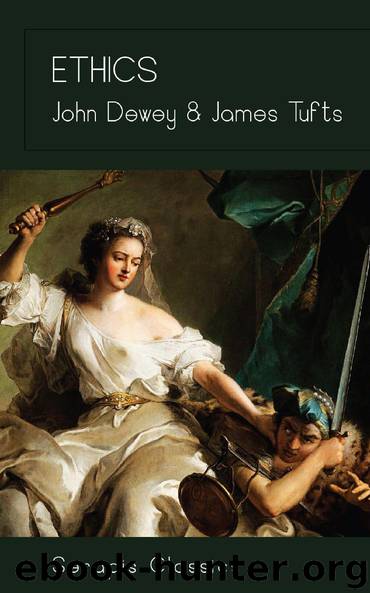Ethics by John Dewey James Tufts

Author:John Dewey, James Tufts [John Dewey, James Tufts]
Language: eng
Format: epub
Publisher: Serapis Classics
Published: 0101-01-01T00:00:00+00:00
§ 2. KANT'S THEORY OF PRACTICAL REASON
Kant is at one with the hedonist as regards the natural object of desire; it is pleasure. All purposes and ends that spring from inclination and natural tendency come under one head: self-love. Hence, the ordinary use of intelligence is confined to the matter of passing upon what constitutes the individual's private happiness and how he shall secure it. There are then fundamental contrasts between ordinary practical activity and genuinely moral activity, contrasts which reflect themselves in the theory of the nature and function of moral knowledge. (1) The moral end is unqualified, absolute, categorical. It is not something which we can pick or leave at our option. Morality is the region of final ends, ends not to be disputed or questioned; and reason must set forth such final ends. Since, however, happiness is not a morally necessary end, intelligence in its behalf can only give hypothetical counsel and advice: if you would be happy, or happy in this, or that way, then take such and such measures. Reason which promulgates ends must be of a different sort from the intelligence which simply searches for means.
(2) Morality is not qualified, but certain in its requirements. The most inexperienced, the humblest, the one most restricted in his circumstances and opportunities, must know what is morally required as surely as the wisest and most educated. Hence moral reason must utter its precepts clearly and unambiguously. But no one can be sure what happiness is, or whether a given act will bring joy or sorrow. "The problem of determining certainly what action would promote the happiness of a rational being is insoluble." (Abbott's Kant, p. 36.) The demand for certainty of precepts in moral matters also requires a special faculty.
(3) Morality, which is inexorable and certain in its demands, is also universal in its requirements. Its laws are the same yesterday, to-day, and forever, the same for one as for another. Now happiness notoriously varies with the condition and circumstances of a person, as well as with the conditions of different peoples and epochs. Intelligence with reference to happiness can only give counsel, not even rules, so variable is happiness. It can only advise that upon the average, under certain conditions, a given course of action has usually promoted happiness. When we add that the commands of morality are also universal with respect to the different inclinations of different individuals, we are made emphatically aware of the necessity of a rational standpoint, which in its impartiality totally transcends the ends and plans that grow out of the ordinary experience of an individual.
An A Priori Reason Kant's Solution. —The net outcome is that only a reason which is separate and independent of all experience is capable of meeting the requirements of morality. What smacks in its origin and aim of experience is tainted with self-love; is partial, temporary, uncertain, and relative or dependent. The moral law is unqualified, necessary, and universal. Hence we have
Download
This site does not store any files on its server. We only index and link to content provided by other sites. Please contact the content providers to delete copyright contents if any and email us, we'll remove relevant links or contents immediately.
Enlightenment Now: The Case for Reason, Science, Humanism, and Progress by Steven Pinker(7313)
A Journey Through Charms and Defence Against the Dark Arts (Harry Potter: A Journey Through…) by Pottermore Publishing(4811)
The Immortal Life of Henrietta Lacks by Rebecca Skloot(4588)
A Journey Through Divination and Astronomy by Publishing Pottermore(4385)
Elon Musk by Ashlee Vance(4127)
Origin Story: A Big History of Everything by David Christian(3692)
COSMOS by Carl Sagan(3624)
Alchemy and Alchemists by C. J. S. Thompson(3521)
Bad Pharma by Ben Goldacre(3428)
Enlightenment Now by Steven Pinker(3368)
Shadow of Night by Deborah Harkness(3368)
Inferior by Angela Saini(3314)
A Mind For Numbers: How to Excel at Math and Science (Even If You Flunked Algebra) by Barbara Oakley(3307)
Origin Story by David Christian(3201)
The Code Book by Simon Singh(3189)
Signature in the Cell: DNA and the Evidence for Intelligent Design by Stephen C. Meyer(3138)
The Elements by Theodore Gray(3057)
A Brief History of Time by Stephen Hawking(3024)
A Journey Through Potions and Herbology (A Journey Through…) by Pottermore Publishing(2852)
